Change a life; strengthen a Community
The backbone of a community is the individuals and families that live within it. Family breakdown when coupled with family violence is one of the most stressful experiences a person can have. It is widely accepted that separation and divorce rank among life’s most traumatic experiences, for adults and children. These stressors can be significantly compounded by the legal process. PCLC provides legal and social support services that endeavour to support individuals and their families through the legal process to a safer and more stable future.
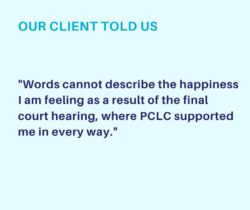 Currently PCLC employs 14 family law and family violence lawyers. These lawyers provide duty services at State and Federal Courts, advice and on-going legal assistance including family law litigation. 52% of clients assisted by the Centre have matters relating to family law and family violence.
Currently PCLC employs 14 family law and family violence lawyers. These lawyers provide duty services at State and Federal Courts, advice and on-going legal assistance including family law litigation. 52% of clients assisted by the Centre have matters relating to family law and family violence.
It is important that we are accessible to community members who are the most in need. We do this by offering extensive duty services at the Federal Circuit Court, Dandenong and at the Frankston and Moorabbin Magistrates’ Courts (Family Violence List). We also have family violence lawyers embedded in maternal health services and in the social work department at Frankston Hospital. This is in addition to our phone and face to face appointments available at all branches and numerous visiting services.
Our duty lawyers see clients with multiple legal and social complexities, often in urgent need of legal assistance. As the demographic composition of Australia changes, our duty lawyer services at Federal Circuit Court continue to witness an increase in matters arising from the relocation of children to various overseas countries; some of which are not signatories to International Conventions made to address the non-consensual removal of young children internationally.
Alhaadi’s story
 Alhaadi was an international student from Kenya studying in Australia. He was of low means and unable to afford a private lawyer. During his time here, he married Eidi and they had a child. The relationship broke down after a dispute arose back in Kenya about the dowry that Alhaddi’s family was expected to pay to his bride’s family. Without the Alhaadi’s knowledge, Eidi obtained Kenyan travel documents which permitted her to remove the child from Australia back to Kenya. Upon arrival there, the Eidi left the child with the maternal grandmother and then returned to Australia.
Alhaadi was an international student from Kenya studying in Australia. He was of low means and unable to afford a private lawyer. During his time here, he married Eidi and they had a child. The relationship broke down after a dispute arose back in Kenya about the dowry that Alhaddi’s family was expected to pay to his bride’s family. Without the Alhaadi’s knowledge, Eidi obtained Kenyan travel documents which permitted her to remove the child from Australia back to Kenya. Upon arrival there, the Eidi left the child with the maternal grandmother and then returned to Australia.
Standing up for Dignity
Affordable and appropriate housing is essential for human survival with dignity. Housing is part of the human right to an adequate standard of living. A secure home is often the first step in moving out of the criminal justice system, dealing with drugs and/or alcohol issues, obtaining effective treatment for mental illness and building healthier and happier individuals and families.
With housing unaffordability at an unprecedented high coupled with a severe lack of social housing, more than one million Australians are living in poor-quality housing, particularly those facing wider disadvantage. With some 1.2 million renters in Victoria, it is not surprising that many of the Peninsula Community Legal Centre’s clients have tenancy problems. Typically, our clients’ tenancy problems are complicated by family violence, a history of substance abuse, mental health issues, or disability.
To respond to this need, we operate a specialist Tenancy Assistance and Advocacy Program. We assist tenants in privately rented homes, as well as privately operated rooming houses and caravan parks, across the Southern Metropolitan and Bayside Peninsula regions of Melbourne.
Frequently the work of our advocates plays a pivotal role in assisting our clients to maintain affordable and appropriate housing.
Zarine’s story
 Since coming to Australia from Afghanistan in 2008 Zarine, her husband and their 7 children have lived in the same property. The family received a notice to vacate from their Landlord who was intending to move back into the property. Zarine was concerned that she and her family would not be able to secure a new rental property before they were required to leave, and would find themselves homeless. Zarine had been trying to find a new property, but due to the size of her family and the financial restrictions they faced, due to both adults receiving only Centrelink benefits, it was proving especially difficult.
Since coming to Australia from Afghanistan in 2008 Zarine, her husband and their 7 children have lived in the same property. The family received a notice to vacate from their Landlord who was intending to move back into the property. Zarine was concerned that she and her family would not be able to secure a new rental property before they were required to leave, and would find themselves homeless. Zarine had been trying to find a new property, but due to the size of her family and the financial restrictions they faced, due to both adults receiving only Centrelink benefits, it was proving especially difficult.
Rooming House Outreach Project (RHOP)
The Centre’s innovative Rooming House Outreach Project (RHOP) assists residents and tenants of rooming houses by providing advice and support services.
The RHOP conducts a visiting service to residents of more than 800 registered private rooming houses. Many of these rooming houses are very rundown, unsafe and in a state of severe disrepair. The Australian Bureau of Statistics classifies those who live in rooming houses as homeless because the accommodation is so inadequate and short in tenure. Rooming house residents are among the most vulnerable clients of our tenancy program.
Whilst our rooming house program aims to provide initial tenancy advice to residents, it also identifies residents who are inappropriately housed and connects them to support services to assist them to secure long-term housing appropriate to their needs. Another objective is to identify rooming houses which do not meet minimum legal standards and to report breaches to regulators.
In this past year, the program has conducted 326 rooming house visits. PCLC’s social worker supports the rooming house outreach worker on visits by providing health assessments, material aid and on-going support.
Lorraine’s story
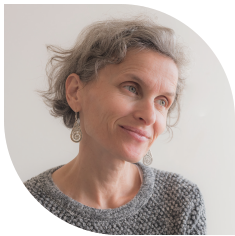 Lorraine had been living in rooming houses for years. Until recently she had been in the same rooming house for 10 years but after her partner died, this was no longer appropriate for her. Lorraine was lucky and found a ‘women-only’ house where she developed strong connections with other residents.
Lorraine had been living in rooming houses for years. Until recently she had been in the same rooming house for 10 years but after her partner died, this was no longer appropriate for her. Lorraine was lucky and found a ‘women-only’ house where she developed strong connections with other residents.
What a difference a lawyer makes
Summary crime, debt and neighbourhood disputes are often seen as the least important matters within our justice system. However, it is these matters, which can impact significantly upon clients already experiencing a multitude of other social and economic adversities.
With restrictions to legal aid and the prohibitive costs of private lawyers, many clients find they are left to advocate for, and often represent, themselves. This can leave vulnerable clients attempting to navigate their way through a complex and confusing legal system.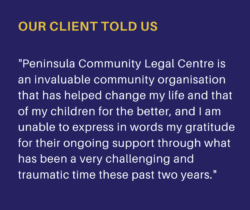
PCLC has worked hard to enhance client accessibility to its services. Four days a week a client can call at 9.00am and be able to speak to a lawyer over the phone later that morning. We also have evening appointments staffed by volunteers and various visiting services across our catchment. Special circumstances appointment are available for clients who may have complex co-existing issues or who may require the support of a caseworker or interpreter.
Alongside the specialist services we provide, such as fines, tenancy, family violence and family law we have a team of community lawyers who assist clients with all those legal problems outside the specialist areas.
Our lawyers assist clients in a variety of ways, negotiating on their behalf, writing letters, drafting documents and finding solutions for problems that the client may feel are insurmountable. A well-crafted plea in mitigation may be all that’s needed to turn a life around.
Simon’s story
 Simon was not travelling well; he had suffered with depression and anxiety for more than a decade. Following the recent breakdown of his 16-year relationship, his mental health began to deteriorate. This downfall was exacerbated by being unable to afford psychiatric support. He was attempting to manage his mental health with the assistance of his GP but had recently stopped taking his medication.
Simon was not travelling well; he had suffered with depression and anxiety for more than a decade. Following the recent breakdown of his 16-year relationship, his mental health began to deteriorate. This downfall was exacerbated by being unable to afford psychiatric support. He was attempting to manage his mental health with the assistance of his GP but had recently stopped taking his medication.
Maree’s story
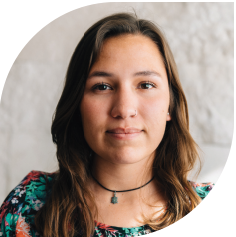 Maree had just given birth to her first child and was attending one of her maternal health appointments. Maree disclosed that her boyfriend, Vince, was currently in prison after assaulting her while she was pregnant. She was feeling stressed and fearful of what would happen when he was released.
Maree had just given birth to her first child and was attending one of her maternal health appointments. Maree disclosed that her boyfriend, Vince, was currently in prison after assaulting her while she was pregnant. She was feeling stressed and fearful of what would happen when he was released.
Responding to injustice and facilitating empowerment
For PCLC, Community Legal Education is an important element of a preventative strategy to empower disadvantaged communities and individuals to respond to social injustice. Community Legal Education can improve clients’ understanding of the law and can raise clients’ awareness of their legal rights. It can also provide strategies to identify and address future legal issues. Our community legal education and community engagement program comprises a broad range of approaches, from face-to-face education and training sessions, to producing fact sheets and brochures, to participation in community networks to ensure that other organisations that work with vulnerable people can identify legal issues and refer clients for assistance.
This year we continued with our regular talks to school and TAFE students, seniors groups, tenants and people at risk of homelessness, separating parents, individuals affected by family violence, as well as practitioners working in specialized services who support these groups.
In particular, we spoke to refugees and migrants at Chisholm Institute on Australian laws of particular relevance to new arrivals.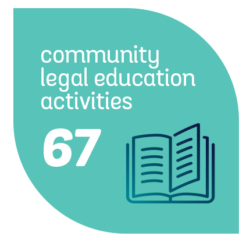
We conducted a series of training sessions for health workers assisting older people to raise awareness of elder abuse and knowledge of available legal services. In collaboration with the Mornington Peninsula Shire, Peninsula Advisory Committee for Elders and Seniors Rights Victoria, we held a Legal Matters and Ageing Forum, with the keynote address being delivered by John Corcoran AM from our pro bono partner Russell Kennedy Lawyers.
We spoke at a number of other family violence panels and meetings, in collaboration with stakeholders including the Magistrates Courts, VLA, Victoria Police, the Department of Health and Human Services, and specialist family violence services.
To support the commencement of our outreach service at the Frankston Orange Door community safety hub, we produced, with the support of the Victoria Law Foundation, a set of educational materials intended to improve understanding of some of the common legal issues experienced by people affected by family violence and to encourage early referrals to legal services.
Law Reform
Our law reform activities are based on the acknowledgement that structural social inequality has been institutionalised by the legal system, and structural change is essential to overcome this. In an effort to address systemic barriers to justice, we regularly contribute to enquiries by parliamentary, law reform and other bodies.
This year, our main law reform focus was mental health and family law. Our submission to the Royal Commission into Victoria’s Mental Health System focused on the impact of family breakdown, family law proceedings and family violence on the mental health of people and their children.
Following PCLC’s detailed submission to the ALRC’s Family Law Review in May 2018 we responded to the ALRC’s Family Law Review Discussion Paper in November 2018. We focused specifically on issues relevant to our family law clients, especially those experiencing family violence. The issues included, whether a dedicated family violence list should be established in the family courts, and if early fact finding hearings should be implemented to hear and determine allegations of family violence at the commencement of family law cases.
We also built on our ongoing law reform work relating to the fines and infringement system in Victoria through the commencement of a special project on the Work Development Permit Scheme (WDP).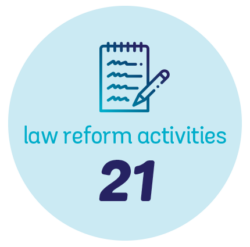
Under this scheme, vulnerable and disadvantaged people can be provided with a non-financial option to address their fines debt. A WDP allows an eligible person to work off their fine debt by participating in certain activities and treatments. Types of activities include: unpaid work, treatment from a doctor, nurse or psychologist, drug and/or alcohol counselling and financial counselling and educational and life skills courses. The time a client spends engaged in activities or treatment is calculated and then translated into a reduction of the outstanding infringement debt. A health practitioner can provide services to clients experiencing mental illness and the client can work off $1,063.85 (6.6 penalty units) per month off their fines debt.
With support from the Legal Services Board, we translated our belief that the WDP scheme has considerable scope to assist vulnerable people with fines, into a special two year project to promote access to the scheme for eligible clients in Melbourne’s South East.
Our project worker is helping to advance the initiative through a range of community development, engagement and education strategies including: production of a WDP Information Package, engaging with potential WDP sponsors to promote awareness of the scheme and to help facilitate their accreditation as sponsors, along with presenting at various peak associations and networks.
